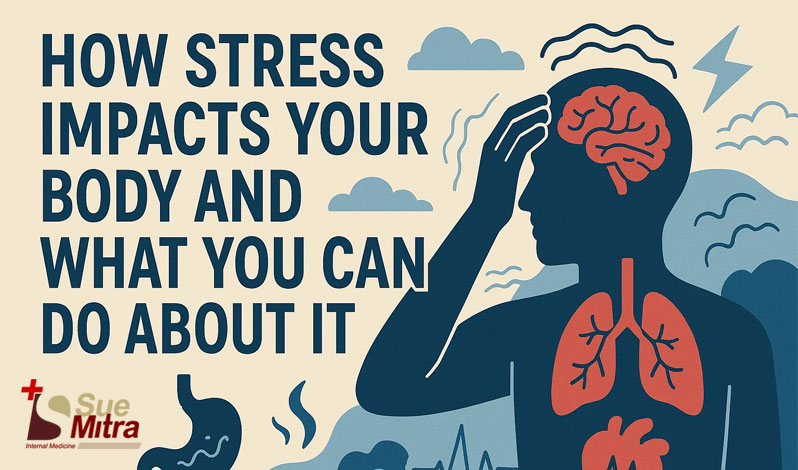
13, Oct 2025
In today’s fast-paced world, stress has become a constant companion for many people. While occasional stress can motivate us to perform better, chronic stress can take a serious toll on both physical and mental health. At Dr. Sue Mitra’s clinic in Melbourne, Florida, we often see how stress can manifest in unexpected ways—and how small lifestyle changes can make a big difference.
The Hidden Effects of Stress on Your Body
Stress isn’t just “in your head.” When you’re under pressure, your body activates the “fight or flight” response, releasing hormones like cortisol and adrenaline. While this reaction can be helpful in short bursts, long-term exposure to stress hormones disrupts normal body functions.
Here are some common ways stress impacts your health:
Cardiovascular issues: Prolonged stress increases your heart rate and blood pressure, putting extra strain on your heart and arteries. Over time, this raises the risk of hypertension, heart attack, and stroke.
Digestive problems: Stress can trigger stomachaches, indigestion, or irritable bowel syndrome (IBS). It may also affect appetite, leading to overeating or loss of appetite.
Weakened immune system: Chronic stress makes it harder for your body to fight off infections, making you more vulnerable to colds and illnesses.
Sleep disturbances: Stress often causes insomnia, restless nights, or poor-quality sleep, which only adds to fatigue and anxiety.
Mental health struggles: Persistent stress is linked to anxiety, depression, and burnout, impacting overall quality of life.
What You Can Do to Manage Stress
The good news is that stress doesn’t have to control your life. By recognizing the signs early and taking proactive steps, you can reduce its impact and restore balance.
Practice relaxation techniques: Deep breathing, meditation, or yoga can calm your nervous system and lower stress levels.
Stay active: Regular exercise releases endorphins, the body’s natural mood boosters, and helps reduce tension.
Prioritize sleep: Aim for 7–9 hours of restful sleep each night by sticking to a regular sleep schedule and creating a calming bedtime routine.
Eat mindfully: A balanced diet rich in fruits, vegetables, and whole grains supports both physical and mental resilience.
Stay connected: Talking with friends, family, or a trusted professional can help lighten the emotional load.
Seek professional care: If stress feels overwhelming, consulting a physician or mental health provider can provide personalized guidance and treatment options.
Taking the Next Step
Stress is a natural part of life, but it doesn’t have to control your health. At Dr. Sue Mitra’s office in Melbourne, Florida, we’re dedicated to helping patients recognize the impact of stress and learn effective ways to manage it. If you’re ready to take steps toward a healthier, more balanced life, give us a call at 321-622-6222 or visit suemitra.com to learn how we can support your journey to better well-being.
Dr. Sue Mitra and her staff strive to offer their patients the best care, advice and services available in the medical field with the goal to keep patient healthy & happy.

Dr. Sue Mitra is board certified in international medicine. She is seen here with a Cologuard, which is a noninvasive colon cancer screening test. (Photo by: Tim Shortt/Florida Today)